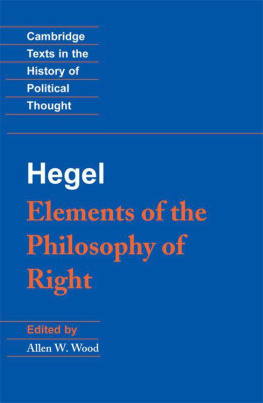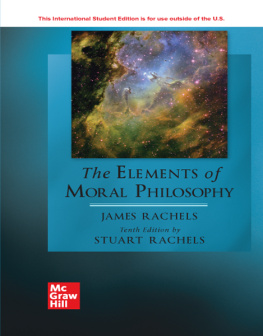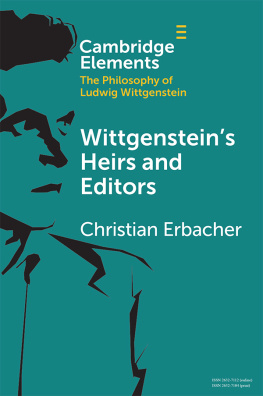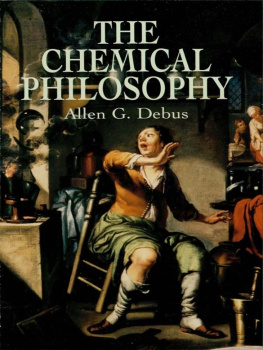Wood Allen W. - Elements of the philosophy of right
Here you can read online Wood Allen W. - Elements of the philosophy of right full text of the book (entire story) in english for free. Download pdf and epub, get meaning, cover and reviews about this ebook. City: Cambridge, year: 2010, publisher: Cambridge University Press, genre: Politics. Description of the work, (preface) as well as reviews are available. Best literature library LitArk.com created for fans of good reading and offers a wide selection of genres:
Romance novel
Science fiction
Adventure
Detective
Science
History
Home and family
Prose
Art
Politics
Computer
Non-fiction
Religion
Business
Children
Humor
Choose a favorite category and find really read worthwhile books. Enjoy immersion in the world of imagination, feel the emotions of the characters or learn something new for yourself, make an fascinating discovery.
- Book:Elements of the philosophy of right
- Author:
- Publisher:Cambridge University Press
- Genre:
- Year:2010
- City:Cambridge
- Rating:5 / 5
- Favourites:Add to favourites
- Your mark:
- 100
- 1
- 2
- 3
- 4
- 5
Elements of the philosophy of right: summary, description and annotation
We offer to read an annotation, description, summary or preface (depends on what the author of the book "Elements of the philosophy of right" wrote himself). If you haven't found the necessary information about the book — write in the comments, we will try to find it.
Elements of the philosophy of right — read online for free the complete book (whole text) full work
Below is the text of the book, divided by pages. System saving the place of the last page read, allows you to conveniently read the book "Elements of the philosophy of right" online for free, without having to search again every time where you left off. Put a bookmark, and you can go to the page where you finished reading at any time.
Font size:
Interval:
Bookmark:
CAMBRIDGE TEXTS IN THE
HISTORY OF POLITICAL THOUGHT
G. W. F. HEGEL
Elements of the Philosophy of Right
CAMBRIDGE TEXTS IN THE
HISTORY OF POLITICAL THOUGHT
Series editors
RAYMOND GEUSS
Professor of Philosophy, University of Cambridge
QUENTIN SKINNER
Professor of the Humanities, Queen Mary, University of London
Cambridge Texts in the History of Political Thought is now firmly established as the major student textbook series in political theory. It aims to make available to students all the most important texts in the history of western political thought, from ancient Greece to the early twentieth century. All the familiar classic texts will be included, but the series seeks at the same time to enlarge the conventional canon by incorporating an extensive range of less well-known works, many of them never before available in a modern English edition. Wherever possible, texts are published in complete and unabridged form, and translations are specially commissioned for the series. Each volume contains a critical introduction together with chronologies, biographical sketches, a guide to further reading and any necessary glossaries and textual apparatus. When completed, the series will aim to offer an outline of the entire evolution of western political thought.
For a list of titles published in the series, please see end of book.
G. W. F. HEGEL
Philosophy of Right
EDITED BY
ALLEN W. WOOD
Professor of Philosophy, Cornell University
TRANSLATED BY
H. B. NISBET
Professor of Modern Languages,
University of Cambridge
and
Fellow of Sidney Sussex College

CAMBRIDGE UNIVERSITY PRESS
Cambridge, New York, Melbourne, Madrid, Cape Town, Singapore, So Paulo,
Delhi, Mexico City
Cambridge University Press
The Edinburgh Building, Cambridge CB2 8RU, UK
Published in the United States of America by Cambridge University Press, New York
www.cambridge.org
Information on this title: www.cambridge.org/9780521344388
Cambridge University Press 1991
This publication is in copyright. Subject to statutory exception and to the provisions of relevant collective licensing agreements, no reproduction of any part may take place without the written permission of Cambridge University Press.
First published 1991
17th printing 2012
Printed and bound by MPG Books Group, UK
British Library Cataloguing in Publication data
Hegel, Georg Wilhelm Friedrich 17701831
Elements of the philosophy of right (Cambridge texts in the history of political thought).
1. State. Theories I. Title II. Wood, Allen W. III. Nisbet, H. B. (Hugh Barr) 1940 IV. [Grundlinien der Philosophie des Rechts. English]
320.101
Library of Congress Cataloguing in Publication data
Hegel, Georg Wilhelm Friedrich 17701831
[Grundlinien der Philosophie des Rechts. English]
Elements of the philosophy of right/G.W.F. Hegel; edited by Allen W. Wood; translated by H. B. Nisbet.
p. cm. (Cambridge texts in the history of political thought)
Translation of: Grundlinien der Philosophie des Rechts.
ISBN 0 521 34438 7 (hardback) ISBN 0 521 34888 9 (paperback)
1. LawPhilosophy. 2. Natural law. 3. State, The. 4. Political science. 5. Ethics. I. Wood, Allen W. II. Nisbet, Hugh Barr. III. Title. IV. Series.
K230.H43G7813 1991
340.1dc20 9021617 CIP
ISBN 978-0-521-34438-8 hardback
ISBN 978-0-521-34888-1 paperback
Cambridge University Press has no responsibility for the persistence or accuracy of URLs for external or third-party Internet websites referred to in this publication, and does not guarantee that any content on such websites is, or will remain, accurate or appropriate.
Hegel was born on 27 August 1770 in Stuttgart, in the south German state of Wrttemberg, son of a middle-class civil servant. His professional career, pursued entirely outside his home state, did not begin until he was over thirty, and was interrupted between 1806 and 1816. His eventual rise to prominence was meteoric: Hegel was offered a professorship at the University of Heidelberg in 1816, followed by an appointment two years later to the prestigious chair in philosophy at the University of Berlin which had had Fichte as its only previous occupant. Hegel occupied this position until his death from cholera on 14 November 1831. The influence of his philosophy began to decline even before his death, but its impact on Prussian academic life was perpetuated through the activity of some of his students, especially Johannes Schulze, who was Privy Councillor in charge of education from 1823 until the 1840s.
Hegels first lectures on right, ethics and the state were delivered in 1817, during his first autumn at Heidelberg. As his text he used the paragraphs on objective spirit from his newly published Encyclopaedia of the Philosophical Sciences (1816) (EH 400452). His second series of lectures came a year later in Berlin. He soon formed the intention of expanding his treatment of this part of the system in a longer text, which probably existed in draft well before his third series of lectures on right and the state were delivered in 18191820.
A fateful turn of political events in Prussia forced him to delay publication of this new work. Since the defeat of Prussia by Napoleon in 18061807, a reform movement within the government had been taking the country away from absolutism and toward constitutionalism. After the defeat of Napoleon in 1815, this made Prussia an object of suspicion and alarm throughout the relatively less progressive continental states, especially Austria and Russia. In the summer of 1819, the cause of reform was decisively defeated by its opponents within the feudal nobility (see Preface, note 18). In September there was a conference of German states in Carlsbad. It imposed censorship on all academic publications and set forth guidelines for the removal of demagogues from the universities. This resulted in the dismissal of several prominent academics, including Hegels old personal enemy J. F. Fries, but also in the arrest of some of Hegels own students and assistants (see Preface, notes 6, 8, 11, 12, 15, 18). In the light of the new situation, Hegel revised his textbook on right, composing a new preface in June, 1820. Published early in 1821, it was to be his last major work.
From the beginning the Philosophy of Right was an object of controversy. The earliest reviews, even those written by men Hegel had counted among his friends, were almost uniformly negative.
The earliest attacks on the Philosophy of Right viewed it solely in relation to the immediate political situation. Later critics in the liberal tradition followed their interpretation, but gave to the image of Hegel as conservative sycophant a broader philosophical significance.
There were always those, however, who insisted that Hegel was fundamentally a theorist of the modern constitutional state, emphasizing in the state most of the same features which win the approval of Hegels liberal critics. This was always the position of the Hegelian centre, including Hegels own students and most direct nineteenth-century followers.
Hegels political thought needs to be understood in relation to the institutions and issues of its own time. Yet this is something even Hegels contemporaries themselves were often unable to do. The difficulty and obscurity of Hegels writings posed problems for them, just as they have for subsequent readers. The Preface of the
Next pageFont size:
Interval:
Bookmark:
Similar books «Elements of the philosophy of right»
Look at similar books to Elements of the philosophy of right. We have selected literature similar in name and meaning in the hope of providing readers with more options to find new, interesting, not yet read works.
Discussion, reviews of the book Elements of the philosophy of right and just readers' own opinions. Leave your comments, write what you think about the work, its meaning or the main characters. Specify what exactly you liked and what you didn't like, and why you think so.











